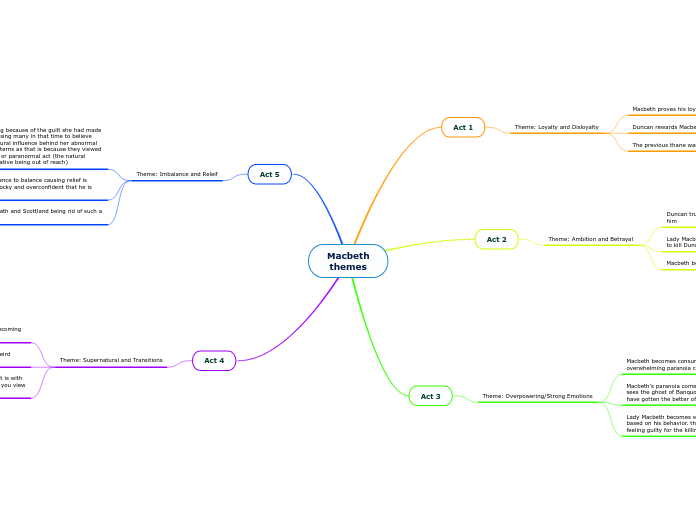Macbeth
themes
Act 1
Theme: Loyalty and Disloyalty
Macbeth proves his loyalty to Duncan
Duncan rewards Macbeth with becoming the thane of Cawdor
The previous thane was a traitor and is executed
Act 2
Theme: Ambition and Betrayal
Duncan trusted that Macbeth would be loyal and not betray him
Lady Macbeth's ambition and desire for power pushes Macbeth to kill Duncan
Macbeth becomes ambitious and betrays Duncan by killing him
Act 3
Theme: Overpowering/Strong Emotions
Macbeth becomes consumed by fear that turns into an overwhelming paranoia causing him to kill more people
Macbeth's paranoia comes to the attention of many after he sees the ghost of Banquo at the banquet proving his emotions have gotten the better of him and possibly drove him crazy
Lady Macbeth becomes worried that her husband is not well based on his behavior. this causes her to conclude that he is feeling guilty for the killing.
Act 5
Theme: Imbalance and Releif
Lady Macbeth sleepwalking because of the guilt she had made her life miserable and causing many in that time to believe that there was a supernatural influence behind her abnormal behavior and sleeping patterns as that is because they viewed asleep walking as a curse or paranormal act (the natural balance of positive to negative being out of reach)
The transition from imbalance to balance causing relief is when Macbeth becomes cocky and overconfident that he is safe
The relief of Macbeth's death and Scottland being rid of such a horrible ruler
Act 4
Theme: Supernatural and Transitions
Macbeth transitions from being overly ambitious to becoming bloodthirsty
His bloodthirsty nature is in tie to the prophecy the weird sisters had introduced
Macbeth becomes clear with where he stands and that is with a "higher power" or "lower power" depending on how you view it, instead of with Scottland
